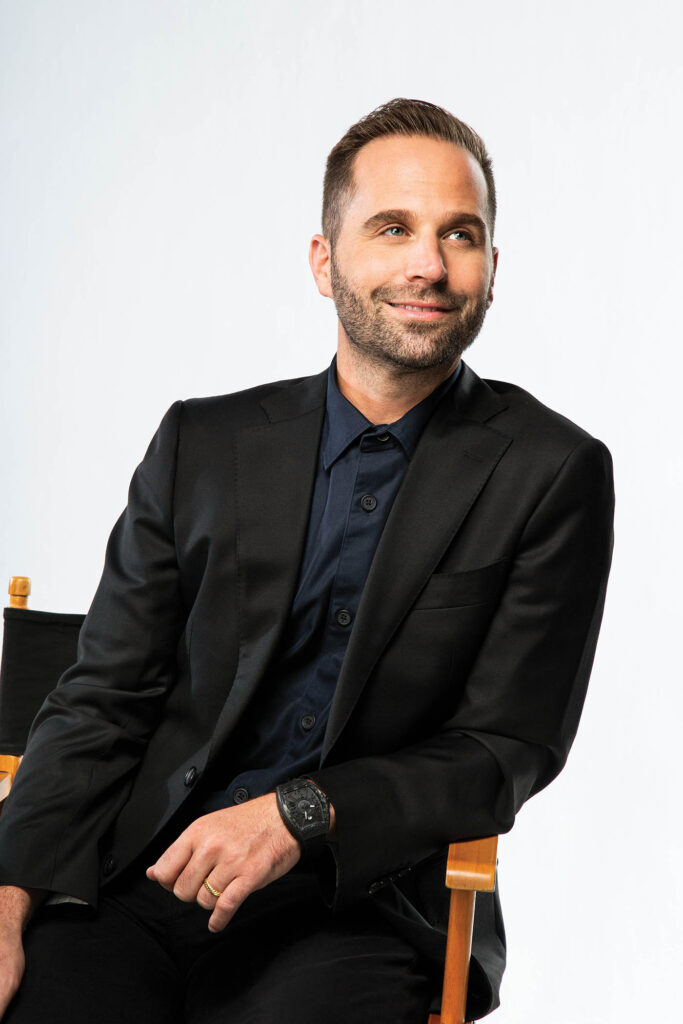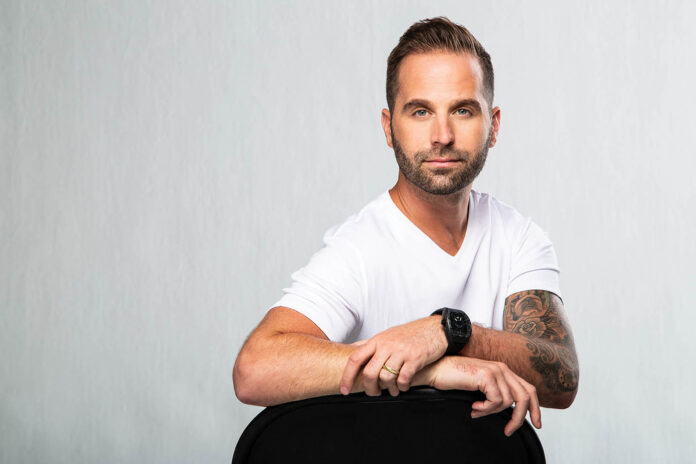“Ever since I was a little kid, I’ve always been an entrepreneur,” said Chad Bronstein. The affable 34-year-old founder and chief executive officer of Fyllo, a compliance, marketing, and data company, grinned and rubbed his sleeve of tattoos as he recounted an adolescence spent honing his hustling.
Bronstein got his first taste of business at age 10, capitalizing on a toy craze in the 1990s. “I roped my mom into helping me resell Beanie Babies,” he explained, positively giddy with the memory. “We would identify the ones that were in high demand, and she would help me find them for sale and resell them. When all the other kids were playing with them, I was turning a profit.”
Spotting opportunities that others overlooked would become a specialty for the budding entrepreneur, who created Fyllo in response to the myriad compliance challenges faced by major cannabis operators in 2018. The business immediately flourished, scaling at breakneck speed as Bronstein and his team unearthed additional revenue streams. Though the acquisitions initially seemed unorthodox, the diverse entities combined to create a formidable and cohesive data, advertising, and compliance solution.
The company, which has grown from three to more than 180 employees in just two years, is a breakout among the many tech-forward “picks-and-shovels” companies that support the industry with ancillary services. Fyllo’s unique hybrid of novel consumer data, real-time legislative insights from every jurisdiction in the country, SMS and MMS marketing, and advertising compliance is applauded by clients for helping them avoid the ire of regulators while aggressively competing.
Bronstein first observed a cannabis opportunity in his previous role as chief revenue officer for Amobee, an independent advertising platform. In 2018, the company suddenly found itself fielding inquiries from Canadian licensed producers, CBD brands like Charlotte’s Web, and vape manufacturers like Juul, all looking for advertising solutions. But given the marketing restrictions on cannabis and the opaque regional laws governing operators’ ability to market, ad platforms weren’t able to help.
“These companies had money to advertise, but no one would touch them because of the regulatory hurdles,” said Bronstein. “I knew there was something there. I wanted to build the team that solved this problem.”
Data on top of data
The pursuit of a technology solution for the marketing-compliance issue also led the Fyllo team to focus on the end consumer. Bronstein and his crew quickly realized there was value in the dataset they were creating—not only for cannabis operators, but also for mainstream brands that at the time didn’t recognize the overlap between their markets and cannabis. Where traditional advertisers may have envisioned lazy stoners lounging on their couches, Bronstein saw an untapped and undervalued consumer segment composed of progressive early adopters. From past experience at Amobee, he knew forward-thinking mainstream brands would covet the intel.
“Take Uber Eats,” said Bronstein, pointing to a Fyllo client whose specific interest in the cannabis consumer was highly publicized in the media earlier this year. “They can’t identify whether someone is buying $200 worth of weed—but they certainly want to, because that’s a consumer who has disposable income and, in all likelihood, likes to eat.”
Among other interesting data points, Bronstein’s team discovered cannabis users are 79 percent more likely than average consumers to stay at a luxury hotel, 76 percent more likely to buy organic baby food, 52 percent more likely to have spent $100 or more on beer in the past thirty days, and 26 percent more likely to buy groceries online. They’re also 67 percent more likely to have adopted home delivery services like Grubhub, DoorDash, Uber Eats, and Postmates.
This sliver of insight alone paints a picture of a highly desirable consumer for a wide variety of industries—particularly quick-service restaurants, which have started aggressively targeting weed smokers in a bid to recapture the growth the category enjoyed in the early 2000s.
Bronstein admitted that when his team first approached mainstream brands with the proposition, they didn’t immediately grasp the concept. “A lot of them were like, ‘Wait, why am I talking about cannabis?’” he said, chuckling. “I told them, ‘Here’s a new, valuable consumer set you are not familiar with,’ and then they’d have that lightbulb moment where they realized what we’re offering suddenly makes a lot of sense.”
But offering data to cannabis firms and non-cannabis brands was just the first step in Fyllo’s plan. The company added a whole new dimension to its proposition when it acquired DataOwl, which provides promotional marketing, loyalty, and point-of-sale solutions.
The most interesting aspect of the acquisition is perhaps the combination of SMS and MMS messaging with Fyllo’s existing compliance software, which ensures communications sent to consumers’ phones are compliant and aligned with regulations, including those for 10-digit long codes (10DLC).
With this move, Fyllo addressed a huge problem for cannabis marketers. In the past couple years, dispensaries and brands have fallen prey to Telephone Consumer Protection Act class-action lawsuits for sending non-compliant text and phone communications to consumers. The statute provides damages ranging from $500 to $1,500 per call or text placed directly or indirectly, which could amount to a fatal blow for small companies.
“You would think being able to text with your customers is simple,” Bronstein said. “It’s not, because regulations vary so widely depending on where you are. Giving brands and dispensaries the ability to connect in a one-on-one setting like a text message is a hugely valuable tool.”
Genesis
Wrapping compliance and communication into one package gave Fyllo a considerable advantage over its competitors. The program could not have been built without the early-2020 acquisition that set what has become a snowball in motion: The surprise $10-million purchase of CannaRegs, a platform offering subscription-based access to federal, state, and local cannabis regulations.
While it seemed like a strange move for a company then largely focused on building consumer datasets, the CannaRegs deal marked a crucial leap forward for Fyllo. Adding a hyper-local cannabis regulatory database helped from an advertising compliance perspective, which Bronstein explained was the primary concern among cannabis marketers.
“Compliance was a really key part of the puzzle for us,” Bronstein said. “Every conversation we were having about advertising led back to compliance and the legal ramifications of noncompliance. We knew if we wanted to have the major brands and agencies take us seriously, then we had to know exactly what was happening with regulations in every state, every jurisdiction, in real time.”
The CannaRegs acquisition took place when both companies were relatively young—Fyllo was barely nine months old at the time—but Bronstein and his team, guided by savvy investors like Jason Wild of JW Asset Management, saw enormous potential in the combination. CannaRegs allowed Fyllo to offer major operators insight into emerging legislation in municipalities anywhere in the country, helping them get a head start on license applications and identify acquisition targets.
“Using our regulatory database, you can search anything that’s happening relating to cannabis at a local-government level,” Bronstein said. “Say a local government is thinking about adding more retail licenses. That gives an MSO [multistate operator] the ability to start research in that market to understand what’s going on.”
He pointed to Columbia Care as a prime example of how an MSO can leverage the full suite of Fyllo’s offerings. The New-York-based company operates dispensaries in fourteen states and uses Fyllo for compliance, advertising, and customer data. According to Columbia Care’s chief growth officer, Jesse Channon, “Our partnership with Fyllo allows us to build effective and targeted digital marketing campaigns with compliance at the forefront. In addition to compliance, Fyllo’s national purchase data repository has enabled us to explore new customer segments in addition to our existing customer base. They are doing incredible things with their suite of software products and services, and the team has been a tremendous resource for us.”
Bronstein said, “We like to think of ourselves like a Salesforce for highly regulated industries,” referencing one of the most widely used enterprise software-as-a-service solutions. “We offer products that allow cannabis companies to be efficient without fragmentation and to utilize the technology that makes their jobs easier.”
People person
Bronstein’s career up to launching Fyllo followed a steep upward trajectory, powered by the insatiable drive of a born salesman and guided by increasingly grand challenges that kept him an underdog. In just a few short years, he rose from regional sales director at a small ad-tech startup to chief revenue officer at Amobee, where he said he significantly increased revenues.

“The truth is, I’m a competitive motherfucker,” he said. “I’ve been part of great teams that have competed against some of the biggest companies in the world. I think to thrive in these kinds of situations, you have to be thick-skinned and able to handle rejection.”
Along the way, he learned a lot about corporate structures and decided they were detrimental to company culture, particularly when companies intended to create innovative solutions for highly regulated, fast-moving industries. Over time, he determined the ideal configuration was a tight-knit, agile group, and that’s what he set out to develop when he finally took the plunge and started a venture of his own.
“Part of the reason I founded Fyllo was because I wanted to run a company my own way,” he explained. “I said to myself, ‘If I’m going to start a company, everything I hated from every job I ever had was not going to be allowed.’ If you want to [Google Chat] me, Slack me, call me, text me, I’ll respond.”
Furthermore, “I don’t care who you are at the company,” he added. “At Fyllo, you treat the janitors the same way you treat the CEO. We don’t have space for ego. We like people who roll their sleeves up, get the work done, and treat people with respect. When we interview and recruit talent, we make it very clear: This isn’t Facebook. We will never try to be that. We want people who have the early stage start-up hustler mentality, who want to have fun and embody the culture we have, which is ‘all in, all out, all together.’”
Of all the things Bronstein believes played a role in Fyllo’s success, he reserves the most praise for his team. Many of the talented people he tapped to join him were colleagues from earlier in his career, convinced to abandon well-paid positions at established companies to help a charismatic young leader blaze a trail in the most exciting industry to emerge in a generation. “I really believe Fyllo grew as fast as we did on the back of this talent we were blessed with,” he said. “It was this team that was looking for something new and fresh that was able to get us through all of the challenges we faced in the early days.”
Brazen youth
Bronstein originally set out to raise about $4 million to assemble a team and build the earliest iteration of what would become the Fyllo Compliance Cloud. He ended up raising $16 million in a seed round led by JW Asset Management and K2 & Associates.
“It was pretty bold,” he admitted. “They wrote two large checks based on a deck and our vision. That allowed us to really go, and their relationships with some of the biggest companies in the industry was really important to us in those early stages.”
Despite Fyllo’s team of top-tier talent, a surplus of start-up capital, and a couple of the industry’s deepest contact lists, cannabis still presented myriad challenges for the brazen upstart. Bronstein soon discovered boldness and raw belief in the product weren’t enough to move the company from concept to success.
“I got the shit kicked out of me,” he said, chuckling and shaking his head as he recalled rejection after rejection. “Anyone who says they came into the cannabis industry and didn’t get the shit kicked out of them is lying.
“I think in order to be successful in cannabis, you have to have a strong backbone,” he added. “I knew if I [founded my own company], I would want to have the kind of people around me who would lift me up when I’m down and feed off my energy. I always try to find people who have similar energies.”
Positive energy and alignment of core values also proved indispensable during acquisitions. Both CannaRegs and DataOwl matched the Fyllo team’s insatiable hunger for besting the competition. “When we’re doing acquisitions, we look for companies that want to win, want to win together, and believe in the strategic vision,” Bronstein said. “It’s also important that they are willing to give up some of their old ways to go with the new ways.”
He said he adopted that mindset early, after the acquisition that landed him at Amobee. There, he studied the nuances of successfully merging teams with complementary products or services—along with the drawbacks of not considering how they might clash. “When you make acquisitions that are very similar to your core product but you don’t make changes in the teams, you create a natural competition and an unknown,” he explained. “Also, if you buy something that is set in its ways and isn’t willing to transition to the new way of doing things, you’re going to have competing methodologies. When you have that and you aren’t cohesive, it leads to demise. I’ve been a part of that before, and it’s a mess.”
The great unknown
Given Fyllo’s suite of data, advertising, and compliance offerings came together organically, Bronstein isn’t sure exactly where or when the next merger or acquisition opportunity will arise. But with the company’s foundation firmly established, the focus has shifted to deepening the value provided to clients. “Our primary goal with our strategy is to continue to build substance around our core offerings,” he said. “Fyllo started with just two offerings, but we were able to build out an enterprise offering by finding creative acquisitions that made Fyllo better and the industry better.”
He and his team recognize the potential for expanding their platform across a range of highly regulated industries, such as online gambling and telemedicine. However, a tremendous amount of work remains to be done in the cannabis industry, particularly with federal legalization looming somewhere on the horizon.
Bronstein and the Fyllo crew are motivated by setting new standards in an industry shaping up to be one of the most exciting commercial and medical opportunities of the twenty-first century. That he’s doing it his way makes it all the sweeter, he said. “It feels good that we’re building something special in terms of our company culture, and we’re at the frontier of a new industry that is changing the world,” he said. “I hope we can all look back years down the line and be proud to say we were part of that.”
He paused and smiled, rubbing his tattoo sleeve and giving himself a moment to savor the wild journey so far. “That’s what gets me going every single day.”











[…] a major value-add to any company he’s invested in and has a lot of integrity as a human,” said Chad Bronstein, co-founder and chief executive officer at Fyllo, one of the industry’s fastest-growing […]